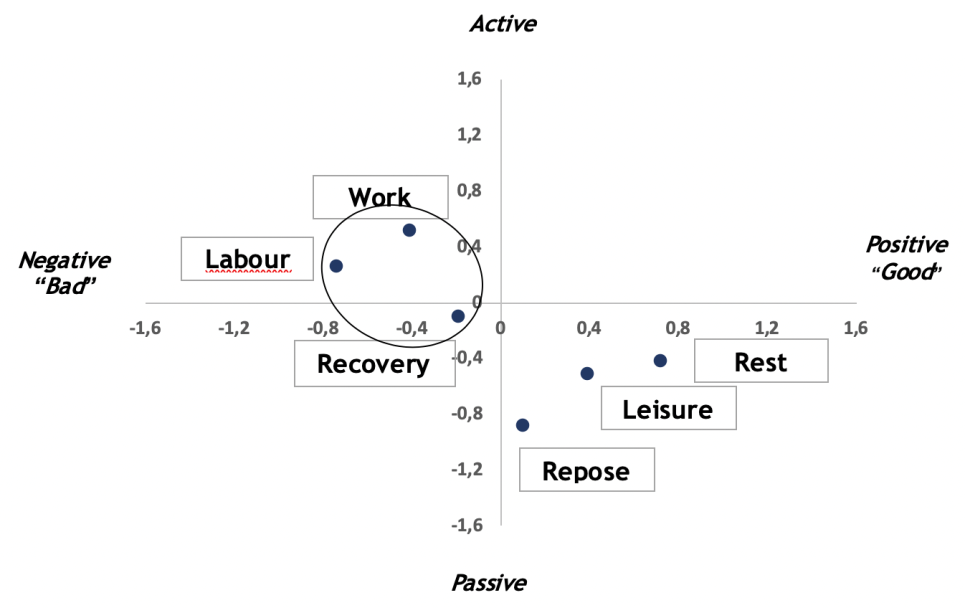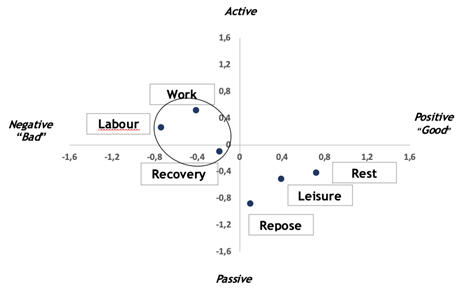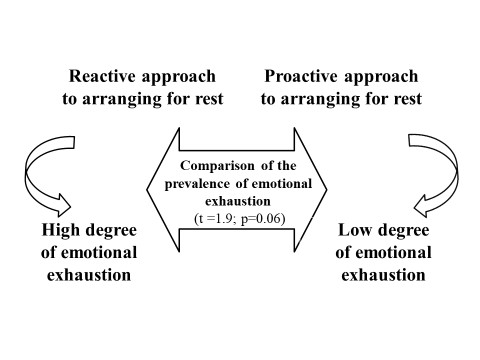Abstract
Research topicality. The research topicality is related to understanding of the efficiency of human functional states’ (HFS) self-regulation means in case of flexible work arrangements in employees with different approaches to self-arrangement of rest. Research aim. The empirical study is targeted to estimate employees’ understanding of (1) subjective value and prearrangements of short-term rest breaks, (2) results of HFS self-regulation during rest breaks. Methodology. The sample: employees of different companies with the accepted possibility of flexible work schedules self-arrangement (n=207). According to the research aim, the complex diagnostic package includes: the 14 scales semantic differential test; checklists on subjective evaluation of rest planning and recovery efficiency during work breaks; coping and state self-regulation means questionnaires. Results and conclusions. Psychosemantic analysis helped to reveal two types of subjective attitude to short-term rest (proactive and reactive) and empirical criteria for classification. The two attitudes towards recovery in short work breaks (trophotropic and ergotropic) were set up. It was found out that trophotropic attitude is typical for employees with proactive rest approach: they perceive recovery as the main rest result. Ergotropic attitude is found in employees with reactive rest approach: recovery is something we need because of work related exhaustion. Employees with proactive rest planning demonstrated better recovery in comparison with reactive oriented employees. The revealed difference in recovery is related with the wide-range of self-regulation and coping means, used by proactive employees, while reactive employees mostly tend to apply only emotional means of coping-related communications with colleagues and friends.
Keywords: Flexible work arrangementsself-regulation of human functional staterestproactive and reactive approach to restrecovery efficiency
Introduction
Psychological research of rest and recovery in employees of modern organizations is one of quite new and prospective work psychology branches ( Luzianina & Kuznetsova, 2014; Pang, 2017; Pojitnoi & Chromeshkin, 2011). The topicality of rest psychology research is related to the rapid development of work flexibility as well as the increase of attractiveness of high autonomy in work for employees ( Gurova, 2016; Thompson et al., 2015).
Notion of modern work includes high degree of autonomy in performance with respect to time schedule planning. One of the main problems here is the increase of work activities during off-job time: people tend to work more even at night time ( Pang, 2017; Stroh & Kozyak, 2015). Whatever reasons are, the consequences lead to decrease of rest.
While in traditional work environment work-rest scheduling is the part of organizational responsibility, nowadays high amount of modern companies introduce flexible work schedule with mitigated control of working hours and allow employees to arrange the time schedule by themselves – so the control can be performed on the meet-the-deadline basis ( Campbell, 2017; Gurova, 2016). Therefore, in case of distant work meeting the deadline becomes the main criteria of the work quality evaluation, since full time e-monitoring of working hours is a too expensive and complicated control procedure ( Leonova, 2020).
The situation of the global “pandemic switch” to distant work obviously highlighted the urgency of psychological understanding of the employees’ attitudes to rest and recovery. Extreme conditions of the long-time period of work at home with the mostly blocked off-line work communications pointed out the lack of employees’ soft-skills in self-regulation in general, as well as in self-arrangement of work-rest schedule in particular. The brief research of employees of 15 organizations in Moscow urban management domain, conducted in April-May 2020 (the whole amount of participants – 215 employees, 65 male and 150 female, age range – form 24 to 55), clearly revealed the stress factors of distant work at home, when you are nearly locked at home place. 75% of the employees switched to the distant work communication observed increased work strain, inability to cope with workload because of improper work-rest time scheduling, permanent feeling of fatigue accumulation.
Problem Statement
The obtained data confirmed that the key predictors of effective distant work in flexible work arrangements are self-management skills. Decrease of workability in distant and flexible work could be connected with the failures in self-regulation of a human functional state (HFS) ( Hockey, 2003; Leonova, 2003). Low HFS self-regulation leads to increase of fatigue and stress ( Leonova et al., 2019; Rook & Zijlstra, 2006). On the opposite, well-developed HFS self-regulation skills provide effective stress-management and highly required in order to achieve proper recovery during work breaks, and to maintain well-being of employees ( Luzianina & Kuznetsova, 2014; Rubery et al., 2016). Moreover, effective HFS self-regulation could be interpreted as one of the key competences for those employees, who work in flexible organizational environment and involved in distant work ( Kuznetsova & Titova, 2016; Morosanova et al., 2017).
One of the prospective research fields here is the psychological analysis of effective HFS self-regulation during short-term work breaks - the breaks for operative recovery as a part of daily schedule. In terms of self-planning of working process, it is feasible to leave a time lag in the schedule for self-regulation of the state to recover and enhance the workability. Psychological research of short-term rest and recovery could be clustered into 2 groups: (1) approaches to rest planning as a special self-regulation activity, targeted to negative chronic HFS prevention; (2) attitudes of employees to short-term rest allocating in self-arranged work schedule, which provide proper recovery time and recovery means.
Research Questions
In previous research, conducted for investigation of rest in hierarchy of life values, the two opposite approaches to rest self-arrangement were elicited: proactive and reactive ( Luzianina & Kuznetsova, 2014). Proactive approach is based on the attitude to rest as to the one of the main instrumental life values. For proactive approach forward looking rest planning is typical: the main aim of rest is a good recovery. Reactive approach manifests itself in only declarative acceptance of high value of rest: the main characteristics - lack of special rest planning and only spontaneous recovery means.
In order to reveal the attitudes to short-term rest within employees with high level of work autonomy in work tasks execution, the following research questions were formulated:
Is it possible to find the signs of proactive approach to short-term rest during work breaks?
To what extent proactive approach provides more effective HFS self-regulation for recovery purposes during short-term breaks – in comparison to reactive approach?
Purpose of the Study
In order to get empirical data to clarify some aspects of the mentioned above questions the empirical research was conducted. The aim of the research is to estimate employees’ attitudes towards planning and arrangements of short-term breaks for recovery purposes and to clarify the HFS self-regulation efficiency during such breaks.
The research tasks included: (1) to find the manifestations of proactive and reactive approaches to short-term rest in work breaks; (2) to estimate employees representations of HFS self- regulation means that help to achieve effective recovery during short-term breaks; (3) to reveal the increase of work stress as the consequence of ineffective HFS self-regulation in flexible work.
Research Methods
In the study 207 employees of different service organizations participated (72 male and 135 female employees, 18 to 60 years old; М=34.8). All participants work in flexible work environment, some of them work distantly.
Diagnostic set of assessment methods included the following instruments: (1) the 14-scales semantic differential as an instrument to measure the degree of subjective similarity between the notion “Recovery” with different notions form work and rest domain: “Labor”, “Work”, “Rest”, “Leisure”, “Repose” ( Artemyeva, 1999); (2) special checklists developed to investigate (a) planning of rest, (b) rest effectiveness, (c) typical HFS self-regulation means for brief recovery during short work breaks ( Luzianina & Kuznetsova, 2014); (3) the strategic approach to coping scale (SACS) questionnaire ( Hobfoll et al., 1994; Vodopyanova & Starchenkova, 2003).
Findings
The data indicated that the majority of the subjects had a reactive attitude toward rest; indicators of a proactive attitude toward rest were found for only 34.7 % of respondents. The elicited manifestations of both approaches were merged by experts into the 6 categories (see Table
Analysing the meaning of the concept of “recovery” through its subjective similarity to the concepts of “work” and “rest” on a two-dimensional semantic field (using results from the semantic differential method) is particularly important for assessing the potential for a proactive approach to operational recovery rest. Clustering (via K-means) the specialists with the highest level of independence in planning their work schedules (n = 123) identified some drawn more toward “recovery” and “work” and others drawn more toward “rest”; and this indicated a fundamentally different assessment of their potential for operational recovery between those who were: (1) ergotropic, for whom strength is something expended at work (see Figure


Analysis of data on sleep and rest away from work (see Table
It can be assumed that the trophotropic orientation applies not only to short-term periods of rest, but that it also has positive effects on finding temporary opportunities to rest after all the work planned for a day has been completed. There were no significant differences between the clusters related to gender, age or profession. It is also noteworthy that there were no differences in indicators of fatigue, which is moderate for those in both clusters.
It is informative that the specialists who enjoy a higher degree of independence in arranging work reported that they rest very little during the day (see Table
First of all, there is pertinent information on the accumulation of adverse symptoms due to depletion of resources in subjects with proactive and reactive attitudes toward rest. Therefore, analysis of the most common models of coping behavior and indicators of depleted resources has shown that employees with a reactive approach typically experienced a high degree of emotional exhaustion (see Figure

Therefore, lack of proactive planning and of arranging rest in advance reduces the effectiveness of HFS self-regulation when there is a high degree of autonomy in planning work schedules. This conclusion is indirectly confirmed by the fact that professionals with different approaches to arranging rest had dissimilar ideas about careful actions as a method for self-regulation under stress. Foresight and caution in choosing the method of HFS self-regulation were more typical for subjects who had a proactive approach to rest (t = 2.1; p = 0.039). It is possible that being proactive in arranging rest also extends to balanced choices of methods to offset stress.
The hypothesis that the pro-social methods of overcoming tension to which many people turn during short-term operational recovery rest are highly effective was then tested. For this purpose the sample was separated into three clusters grouped (via K-means) by a combination of indicators for nine models of coping behavior. The results indicated that the effectiveness of rest and recovery for the employees who used predominantly socially oriented models of coping behavior was relatively low. It was precisely this subgroup, which had the fewest respondents reporting improvement in mood and physical recovery after work breaks (that were usually occupied in intense and emotionally laden interaction with colleagues and friends). A positive change in mood was typical only for the employees with a broad and varied repertoire of coping models (χ2 = 12. 6; р= 0.013).
These data are valuable because they emphasize that social support methods alone directed primarily at the emotional release of stress factors through communication with colleagues and friends, as well as joking and turning anxiety and irritation into anecdotes, which many of us prefer to turn to, do not confer actual recovery ( Rook & Zijlstra, 2006). A deeper, multi-level optimization of one’s HFS may be obtained by consciously planning work breaks based on diverse methods of self-regulation.
Conclusion
According to the discussed findings, the following conclusions could be made:
Proactive approach to short-term rest arrangement, based on the rest planning and HFS self-regulations means acquisition in advance, could be interpreted as the basis for effective recovery for those employees with high work autonomy degree, who work in flexible work arrangements;
Employees showing signs of proactive approach to short-term rest are more resistant to emotional exhaustion accumulation under high work pressure;
The results of short-term rest during self-arranged work breaks are more related to high variability of applied HFS self-regulation means and coping procedures, and less related to only emotional abreaction of flexible work stress factors.
The obtained data form a good basis for the design of psychological interventions, targeted to HFS optimization and workability increase, and for implementation of intervention programs for those employees, who carry out their work in flexible work arrangements ( Kuznetsova & Titova, 2016; Leonova, 2003). The interventions could be based on (1) the design of optimal work breaks’ schedules for operative recovery; (2) the implementation of training programs for HFS self-regulation skills development; (3) the guidelines for HFS self-regulation means acquisition under stress factors of work flexibility in order to increase recovery and to prevent fatigue and stress symptoms accumulation.
References
- Artemyeva, E. Y. (1999). Osnovy Psikhologii Subjektivnoi Semantiki [Basics of Psychology of Subjective Semantics]. Smysl. https://search.rsl.ru/ru/record/01000613072
- Campbell, I. (2017). Working-time flexibility: diversification and fragmented time systems. In D. Grimshaw, C. Fagan, G. Hebson, & I. Tavora (Eds.), Making work equal (pp. 108-125). https://doi.org/10.7765/9781526125972.00013
- Fritz, C., & Crain, T. (2016). Recovery from work and employee sleep: understanding the role of experiences and activities outside of work. In J. Barling, Ch. M. Barnes, E. L. Carleton & D. T. Wagner (Eds.). Work and Sleep (pp.55-76). Oxford University Press. https://catalog.loc.gov/vwebv/holdingsInfo?searchId=29922&recCount=25&recPointer=3&bibId=18881330
- Gurova, I. M. (2016). Distantsionnaya rabota kak perspectivnaya forma organizatsii truda dlya rossiiskikh predprinimatelskikh struktur [Distant work as prospective form of work design for Russian entrepreneurs]. MIR (Modernizatsiya. Innovatsii. Razvitie), 7(1), 151-155. https://doi.org/10.18184/2079-4665.2016.7.1.151.155
- Hobfoll, S. E., Dunahoo, C. L., Ben-Porath, Y., & Monnier, J. (1994). Gender and coping: The dual-axis model of coping. American Journal of Community Psychology, 22(1), 49-82. https://doi.org/10.1007/BF02506817
- Hockey, G. R. J. (2003). Operator functional state as a framework for the assessment of performance degradation. In G. R. J. Hockey, A. W. K. Gaillard, & O. Burov (Eds.), Operator Functional State: The Assessment and Prediction of Human Performance Degradation in Complex Tasks (pp. 8-23). Amsterdam: IOS Press. https://lccn.loc.gov/2003107601
- Kuznetsova, A. S., & Titova, M. A. (2016). Effektivnaya samoregulyatsiya funktsionalnogo sostoyaniya v napryajennykh usloviyakh kak differentsiruyushchaya kompetentsiya [Efficiency of human functional state self-regulation under work tension as discriminating competence]. Organizatsionnaya Psikhologiya i Psikhologiya Truda, 1(1), 84-109. http://work-org-psychology.ru/cntnt/bloks/dop-menu/arhiv-vipuskov/n2016/tom-1-1/effektivnaya-samoregulyaciya-sos.html
- Leonova, A. B. (2003). Functional status and regulatory processes in stress management. In G. R. J. Hockey, A. W. K. Gaillard, & O. Burov (Eds.). Operator Functional State: The Assessment and Prediction of Human Performance Degradation in Complex Tasks (pp. 36-52). Amsterdam: IOS Press, 2003. https://istina.msu.ru/publications/article/1336985/
- Leonova, A. B. (2020). Urovni analiza deyatelnosti sotrudnikov organizatsii [The levels of analysis of employees’ work activity]. In A. B. Leonova (Ed.). Organizatsionnaya Psikhologiya [Organizational Psychology] Moscow: INFRA-M. 86-96 https://infra-m.ru/catalog/psikhologiya_1/organizatsionnaya_psikhologiya_uchebnik_3
- Leonova, A. B., Blinnikova, I. V., & Kapitsa, M. S. (2019). Transformatsiya sistemy kognitivnykh resursov pri vozrastanii emotsionalnoi napryajennosti [Cognitive resources’ transformation under emotional tension increase]. Vestnik Moskovskogo Universiteta. Seriya 14. Psikhologiya, 1, 69–90. https://doi.org/10.11621/vsp.2019.01.69
- Luzianina, M. S., & Kuznetsova, A. S. (2014). Tipologicheskie osobennosti otnosheniya k rabote i otdykhu kak factory effektivnosti truda i udovletvorennosti juzniyu sovremennogo professionala [Types of employees’ attitudes towards work and rest as predictors of work efficiency and life satisfaction]. Prikladnaya Yuridicheskaya Psikhologiya, 3, 147-157. https://www.elibrary.ru/item.asp?id=22137044
- Morosanova, V. I., Gaidamashko, I. V., Chistyakova, S. N., Kondratyuk, N. G., & Burmistrova-Savenkova, A. V. (2017). Regulatory and personality predictors of the reliability of professional actions. Psychology in Russia: State of the Art, 10(4), 195-208. https://doi.org/10.11621/pir.2017.0417
- Pang, A. S-K. (2017). Rest: why you get more done when you work less. Penguin random house. https://lccn.loc.gov/2016036492
- Pojitnoi, N. M., & Chromeshkin, V. M. (2011). Osnovy teorii otdykha [The Basics of the Theory of Rest]. Saint-Petersburg: Saint-Petersburg institute of management and economics press. https://rusneb.ru/catalog/002676_000027_IRKNB-RU_%D0%98%D0%9E%D0%93%D0%A3% D0%9D%D0%91_HOBBIT_51.204_%D0%9F%2046-124169
- Rook, J., & Zijlstra, F. R. H. (2006). The contribution of various types of activities to recovery. European Journal of Work and Organizational Psychology. 15(2), 218-240. https://doi.org/10.1080/13594320500513962
- Rubery, J., Keiser, A., & Grimshaw, D. (2016). Flexibility bites back: the multiple and hidden costs of flexible employment policies. Human Resource Management Journal, 26(3), 235-251. https://doi.org/10.1111/1748-8583.12092
- Sonnentag, S., & Kruel, U. (2006). Psychological detachment from work during off-job time: The role of job stressors, job involvement, and recovery-related self-efficacy. European Journal of Work and Organizational Psychology, 15(2), 197-217. https://doi.org/10.1080/13594320500513939
- Stroh, W. A., & Kozyak, A. A. (2015). Lichnostnyi smysl balansa mejdu rabotoi i lichnoi jizniyu [Subjective meaning of work-life balance]. Mir Psikhologii, 3, 253-267. https://www.elibrary.ru/download/elibrary_24860940_39411446.pdf
- Thompson, R. J., Payne, S. C., & Taylor, A. B. (2015). Applicant attraction to flexible work arrangements: Separating the influence of flextime and flexplace. Journal of Occupational and Organizational Psychology, 88(4), 726-749. https://doi.org/10.1111/joop.12095
- Vodopyanova, N. E., & Starchenkova, E. S. (2003). Strategii i modeli perodolevayushchego povedeniya [Strategies and models of coping behavior]. In G. S. Nikiforov, M. A. Dmitrieva, & V. M. Snetkov (Eds.). Praktikum Po Psikhologii Menedzhmenta I Professional’noi Deyatel’nostu [Workshop on Psychology of Management and Professional Practice] (pp. 311-321). St. Petersburg: Rech’. https://search.rsl.ru
Copyright information

This work is licensed under a Creative Commons Attribution-NonCommercial-NoDerivatives 4.0 International License.
About this article
Publication Date
26 October 2020
Article Doi
eBook ISBN
978-1-80296-090-7
Publisher
European Publisher
Volume
91
Print ISBN (optional)
-
Edition Number
1st Edition
Pages
1-340
Subjects
Self-regulation, personal resources, educational goals, professional goals, mental health, digitalization
Cite this article as:
Kuznetsova, A. S., & Luzianina, M. S. (2020). Proactive Approach to Rest and Functional States’ Self-Regulation in Flexible Work Arrangements. In V. I. Morosanova, T. N. Banshchikova, & M. L. Sokolovskii (Eds.), Personal and Regulatory Resources in Achieving Educational and Professional Goals in the Digital Age, vol 91. European Proceedings of Social and Behavioural Sciences (pp. 244-252). European Publisher. https://doi.org/10.15405/epsbs.2020.10.04.31

